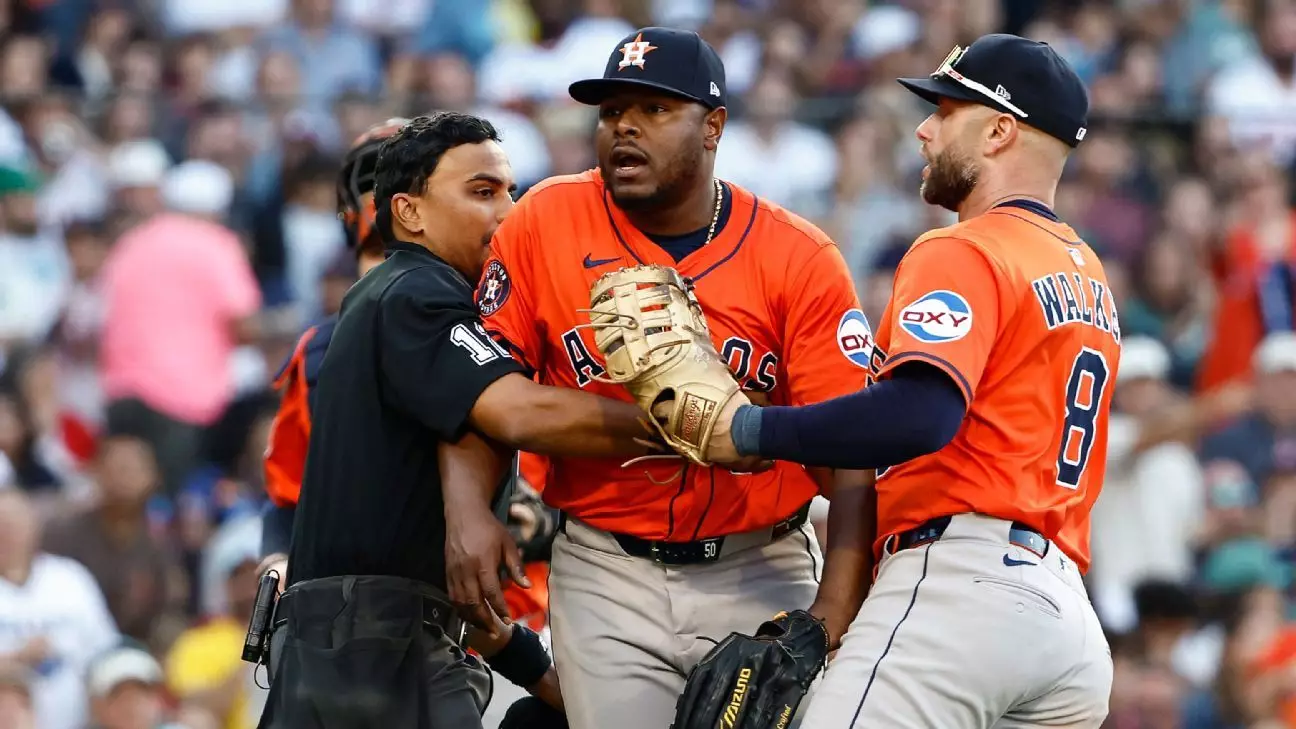Baseball, often romanticized as America’s pastime, is frequently celebrated for its history, tradition, and meticulous nature. However, beneath the polished veneer lies a fierce competitive edge that sometimes erupts into heated confrontations, revealing the sport’s underlying intensity. The recent altercation between the Houston Astros and Boston Red Sox exemplifies how psychological pressure, combined with misgivings about fairness, can ignite conflicts that transcend the game itself.
The incident involves more than just a balk or a routine exchange of words; it symbolizes an enduring struggle over integrity and respect in a sport marred by past scandals. Astros reliever Hector Neris’s decision to use a balk to advance a runner didn’t occur in a vacuum; it was an act that carried with it the weight of suspicion, especially in a league still haunted by previous allegations of sign-stealing. When Neris reacted with dismissiveness towards accusations—merely shrugging off questions with a grin—it reflected a broader issue—whether players and teams feel they are genuinely on fair footing or navigating a landscape riddled with distrust.
What’s noteworthy is that this confrontation did not stay confined to the mound. The exchange with Red Sox third base coach Kyle Hudson swiftly escalated into a more profound dispute, turning a moment of intense gameplay into a theatrical show of tension. Such episodes beckon us to question the integrity of the game and whether the rules are truly ensuring fairness or merely creating an environment where mistrust festers beneath the surface.
The Battle for Trust and the Shadow of Sign-Stealing
Sign-stealing scandals have cast long shadows over Major League Baseball, forever altering the perception of fairness and authenticity. The Astros’ history with electronic sign theft has left a stain that fans, players, and officials are still grappling with. The acknowledgment of past misconduct by the team and the subsequent discipline underscore the league’s ongoing efforts to clean up its image, but incidents like this latest dispute remind us that skepticism still lingers.
Neris’s ambiguous response—“Maybe yes, maybe no”—about stealing signs hints at the pervasive suspicion players have about others bending or breaking rules, whether overtly or covertly. The fact that pitches and signs can be compromised through electronic means, coupled with the possibility of players gaining insight through visual cues or gestures, strains the trust essential for a sport rooted in tradition and fair play. When players express doubts, or when frustrations boil over in moments of high tension, it becomes clear that the battle isn’t just between teams but also about preserving the integrity of the game.
The psychology involved is palpable; players and coaches are caught in a constant dance of suspicion and paranoia, trying to outsmart each other while maintaining the veneer of sportsmanship. The occasional flare-up, such as the recent Red Sox-Astros clash, is often the tip of the iceberg—manifestations of deeper mistrust embedded in the sport’s culture.
The Need for Greater Transparency and Accountability
This incident raises an essential question: how should Major League Baseball respond to the growing distrust among its participants? The league has taken steps to regulate electronic sign-stealing, yet these measures might be insufficient without fostering a culture of transparency. The blurred lines between strategic deception and outright misconduct threaten to undermine the foundational values of fair competition.
Crucially, the pressure to win and the desire to outperform rivals often push players to unconventional and sometimes questionable tactics. The challenge lies in balancing competitive instincts with ethical standards. As one of the key figures involved, Neris’s nonchalant attitude and ambiguous comments reflect yet another layer of complexity—players may be resigned to existing faults rather than actively combating them.
In the end, the debate over sign-stealing, on-field discipline, and gamesmanship does not just belong to the realm of rules and regulations; it is a reflection of a broader struggle to uphold sportsmanship amid the relentless drive to succeed. Until trust and integrity are prioritized as much as winning, baseball will continue to wrestle with moments of conflict that threaten to tarnish its reputation as the gentleman’s game.

